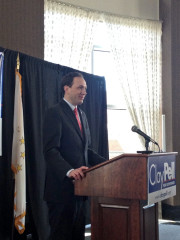Do the RI Gubernatorial Candidates Support Education Reform?
Tuesday, February 11, 2014
Where do the 2014 gubernatorial candidates stand on education reform?
As graduation requirements for Rhode Island high school students -- notably the use of the NECAP test -- continue to be front and center in heated debate across the state, GoLocal talked with both gubernatorial candidates and education leaders on their views at to what's needed to move the state's education system forward when the next administration takes office.
"This is about graduation requirements, not the NECAP," said Board of Education Chairwoman Eva Mancuso. "The opposition has made this about the test. This is about having a graduation requirement that gives our kids competitive edge when they graduate, to make sure that students come out of high school proficient and career ready."
GET THE LATEST BREAKING NEWS HERE -- SIGN UP FOR GOLOCAL FREE DAILY EBLASTThe Providence Student Union has been a vocal critic of the use of the NECAP scores in graduation requirements. Of who will be the next Governor, student representative Hector Perea said, "We believe that the new Governor's main priorities should be inclined towards making schools more student-centered. We need more of the arts and S.T.E.M and less pushing of high stakes standardized testing. The Governor should strive to improve our learning environment, and make our schools more student-friendly, with the resources we need."
NECAP Testing
The recent NECAP results released by RIDE showed that 73% of test takers met the math proficiency requirement to graduation.
GOP gubernatorial candidates Allen Fung and Ken Block talked to the test -- and what they believe they see in the state's future.
Fung spoke on the matter of testing, saying, "Generally, I support testing as a tool for measuring overall educational achievement and as a means to ensure that students are able to meet at least the minimum level of proficiency prior to graduation. I support a move to the PARCC assessment to measure student proficiency in areas of education that are essential to success in college and the workforce."
GOP gubernatorial opponent Block similarly supported testing -- but by a different means as well. “The state plans to phase out the NECAP next year, and replace it with a new test. I believe it is common sense to expect a reasonable level of achievement from our high school seniors, while accounting for those students with learning differences," said Block.
Democratic candidates Clay Pell and Providence Mayor Angel Taveras have come out in strong opposition to the NECAP as a graduation requirement.
"I oppose NECAP as a graduation requirement. High school diplomas are critical to getting a job and going to college. My administration will focus on empowering all of our students to obtain this important credential - we are already losing too many students along the way," said Pell "Testing is an important factor in measuring student growth, but we must ensure teachers have the flexibility to innovate and to inspire in the classroom. Our schools must also be empowered to support alternative pathways and a broad curriculum for all of our students to succeed and take on the unpredictable challenges of the next generation."
General Treasurer Gina Raimondo's spokesperson did not respond Monday to request for comment on the NECAP.
Board of Education Chair Mancuso acknowledged the board was cognizant of the shortfalls, but didn't see that as deterrent for using the test as a means for graduation requirement.
"We don't have a testing problem, we have a math problem," said Mancuso. "Everyone's looking for a great solution. I believe a thoughtful discussion about real issues is helpful -- not finger pointing at teacher, parents, unions -- this is systemic problem that we need to address."
Setting Priorities, Assembling a team
Anna Cano Morales, Director of the Latino Policy Institute at Roger Williams University, said that the state has been "focusing on the end product," when it should be addressing the input.
"This is a huge issue for our economy," said Morales. "Are we adequately preparing our community for tomorrow? Our future workforce is hitting middle school i.e. it's Latino, young, vibrant, and growing. The non-minority population in the state is aging."
"What are the candidates specific plans to address the skills gap? We've been debating NECAPs for two years, after four years of having discussed the policy. I think it talks to a bigger issue," said Morales. "We're having conversations about the symptoms, the practical things -- waivers, waiver policy, graduation requirements, when we're not having conversation about that capacity a district needs to have to succeed. "
Morales noted, "Leadership matters," regarding the next Governor. "Whoever they appoint to the Board of Education, has to be a strong leader in the communities. The chief executive officer appoints who's on the board and at the table making the policies."
Of her role on the Board of Education, Mancuso noted of the upcoming election, "I don't have a dog in the fight," of the next Governor taking office, but added, "I think the biggest thing would be if I had a candidate talking about remediation around grades 3 and 4. That's where we have our first indicators. We also know from our college statistics -- specifically the Providence Plan's data -- we're getting cohorts from RI; we know when kids are in jeopardy in the 3rd our fourth grade."
Christine Lopes Metcalfe with RI-CAN addressed as well that it was imperative that the next Governor appoint the people necessary to move education in the state forward. "The next Governor needs to have a strong agenda to improve public education, seek and appoint change agents to serve on the Board of Education and support proposals to raise educational standards across the state, remove barriers for great schools to grow and give teachers and leaders the freedom and flexibility they deserve," said Lopes Metcalfe.
Looking Forward
Fung said that if elected, he would want to make the Commissioner of Education report to the Governor's Office.
"My priority as governor will be to provide a world class education to all Rhode Island students so that they will be prepared for the workforce of the future," said Fung. "To achieve these results and align our objectives, I will put forth a proposal to have the Commissioner of Education report directly to me as Governor.
Opponent Block pointed to addressing the early grades as being a particular policy objective. “My priority is kindergarten through 3rd grade – we are not doing enough to correct underperformance early in the academic career. The challenge is to provide the resources and methodology to determine which students need help to get on grade level, figure out exactly what those students need, and then provide the environment, resources and support necessary for those students to be remediated. Entry to the fourth grade should be 'high stakes," said Block.
Block continued, "If a child is still learning to read, they cannot read to learn. For fourth-graders to succeed, they need to be ready for the fourth grade. By focusing on kindergarten through 3rd grade, we will be addressing the root of the problem in our educational system."
Democrat Pell told GoLocal, "My administration will ensure that students develop the skills and experience they need to compete in the global economy. This means focusing on science, technology, engineering and math, but also sports, music, the arts and language -- as well after school programs -- which are often pushed aside.."
Pell continued, " We have to equip our students so that they can grow as people and succeed in the workplace. To that end, we must have a strong school-to-work pipeline with internship programs available to every high school. We must also strengthen vocational and adult education, including apprenticeship programs across the state, so that all Rhode Islanders have access to the skills needed to rebuild Rhode Island’s economy."
On education, Raimondo's platform includes investing in school infrastructure.
"With the moratorium on school building set to expire this year, it is time to reinvest in education by creating a dedicated funding stream to bring our existing school buildings and education infrastructure into the 21st century, and build new and better schools," says Raimondo on her campaign website. "We can set aside a dedicated percentage of the state sales tax to pay for school building repair and construction -- and create an authority to administer the program. By creating a steady borrowing stream for long-term investments the program will create economic opportunity and jobs."







